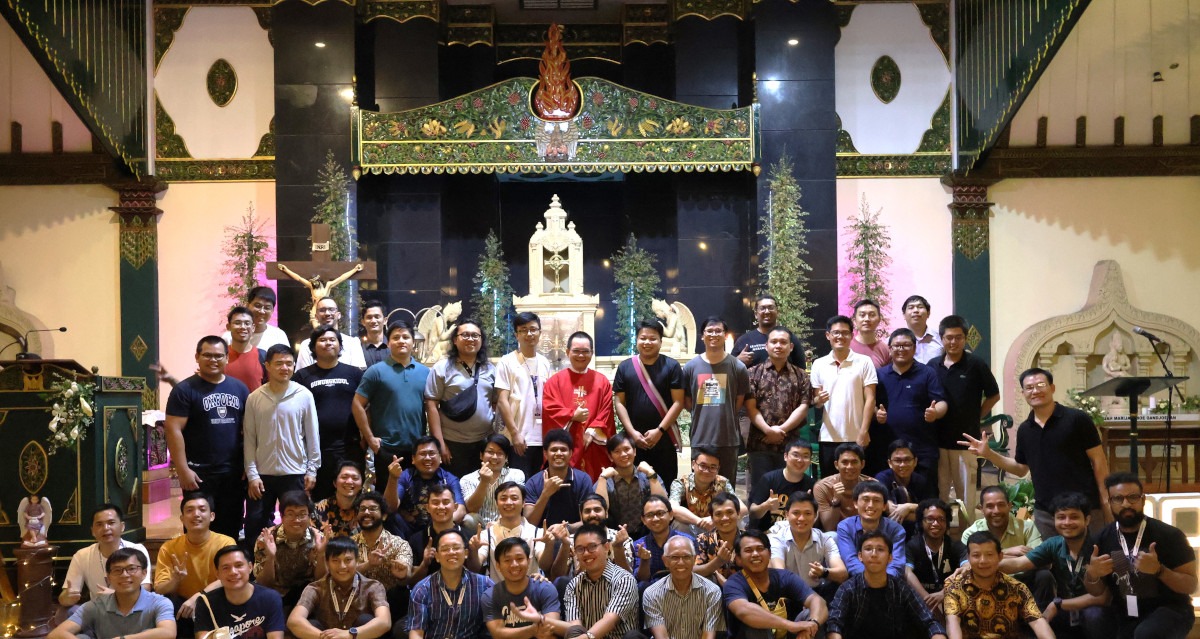 The second chapter of the De Status Societatis (DSS) elucidates the epochal changes and challenges in the world and the Church. Jesuits worldwide are invited to view these changes and challenges as gifts from God. Notably, the DSS highlights the rise and dominance of social media and other technologies, compelling young Jesuits to investigate possibilities of evangelization through these means. During the 10-day Scholastics and Brothers Circle (SBC) meeting in Yogyakarta, we gave ourselves to paying close attention to digital evangelization in view of God’s continuing mission.
The second chapter of the De Status Societatis (DSS) elucidates the epochal changes and challenges in the world and the Church. Jesuits worldwide are invited to view these changes and challenges as gifts from God. Notably, the DSS highlights the rise and dominance of social media and other technologies, compelling young Jesuits to investigate possibilities of evangelization through these means. During the 10-day Scholastics and Brothers Circle (SBC) meeting in Yogyakarta, we gave ourselves to paying close attention to digital evangelization in view of God’s continuing mission.
Together with Thomas Joakino da Costa SJ, I represented the Timor-Leste Region at the SBC, the first one I was gifted to experience. The SBC is an annual event where Jesuit scholastics and brothers from our Asia Pacific conference come together to exchange ideas and experiences, engage in casual and spiritual conversations, and explore possibilities for greater collaboration.
Given that this year’s theme centred on digital evangelization, the sessions included topics such as “Digital Evangelization in the Roman Catholic Church” and “Learning from Vatican Documents: Towards Full Presence–A Pastoral Reflection on Engagement with Social Media” by Paterno Esmaquel II, news editor at Rappler, “Ignatian Spirituality and Social Ministries in the Society of Jesus” by Julie Edwards, JCAP’s Secretary for Social Ministries, as well as presentations from the Indonesian Province’s communications office. Digital evangelization from the Catholic perspective was shared by Matteo-Majus Katolik, complemented by a presentation on the Muslim perspective by Savic Ali of Islami.com. The culminating session was a theological reflection shared by Fr Andreas Setyawan SJ, who finished contextual theology at Sanata Dharma University.

I found the sessions both wonderful and essential. It was wonderful because I came back to the Philippines filled with awe at the seriousness of young Jesuits like me in considering the intricacies of digital evangelization. Essential because I felt an interior sense of urgency and importance in dealing with technology-related epochal changes. All of us grappled with questions that needed to be asked. How should we approach social media as a tool for evangelization? How can we effectively utilise modern-day technologies in the face of disinformation and the disintegration of Church influence? What dispositions and practices must we cultivate to be authentic witnesses to the Gospel in the online world?
Finally, in addition to the intellectually stimulating lectures and discussions, we also dedicated time to visit mission areas around Yogyakarta. These were the same areas in which the first Jesuit missionaries from the Dutch era in Yogyakarta, or Java, established their missions, successfully evangelising and baptising numerous Javanese people. They erected schools, shrines, and churches, achieving remarkable feats with very limited resources. It prompts us to reflect: If they accomplished so much with such constraints, imagine what we can achieve now given the bounteous resources we have at our fingertips.

Bonifacio Bano Lay Ribeiro is a Timorese scholastic studying philosophy at the Loyola School of Theology in Manila.
Related story: Digital evangelization: The Indonesian church experience

